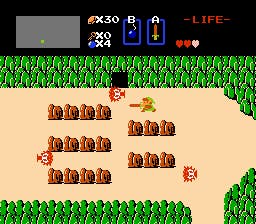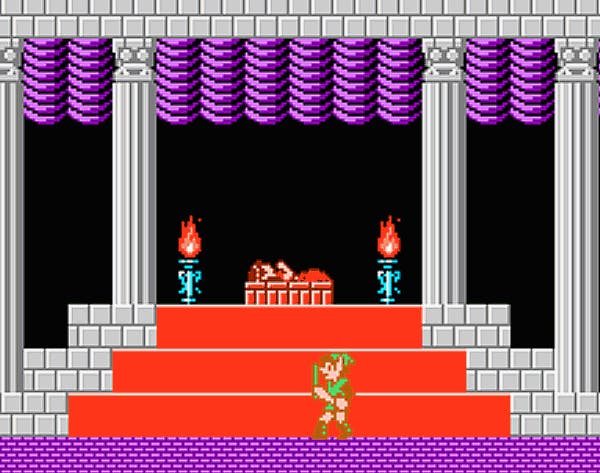The History of Zelda - Part 1
A link to the past.
Looking for Part 2? Click here.
Writing a Legend of Zelda retrospective might not seem like a particularly arduous undertaking; there's so much history attached to the Zelda series, and so much to be said about it, that the words should surely just fly onto the page.
The challenge is in finding anything to say about them that hasn't been said before. This feature started out as a simple history, but unfortunately it soon emerged that such pieces are even more uninteresting to write than they are to read. Anybody can wander onto Wikipedia and find out when a particular game was released, how it was received and what its key features were - I would hope that this article, which should whet your appetite for Eurogamer's imminent review of Twilight Princess, delivers a more subjective and (with any luck) more entertaining viewpoint than that, even if you disagree with every word of it.
There are some omissions; add-ons, spin-offs and expansions like Zelda BS, the infamous Philips CD-i games and Link's Awakening DX are not chronicled (trust me, this article is long enough as it is), and there are no sales figures or statistics or lists of different versions and cartridge colours. I genuinely believe that the Zelda series is a bit more interesting than that. Where some games embody particular genres and some particular themes, Zelda has always defied categorisation. These games are not RPGs, they are not puzzlers, they are not purely action games, they are not anything in particular; they are entirely themselves. It's this singular identity, on top of their ingenuity, spark and sheer character, that makes these games worthy of our respect, attention and, in so many cases, adoration. Zelda titles mark some of the most significant milestones in the history and development of videogames, and they are also the reason that thousands of people (myself included) got into gaming in the first place - they have enchanted generation after generation with their imagination, playfulness, beguiling innocence and enthralling, enticingly secretive virtual worlds.
Part One of this feature covers the first five games. Part Two picks up at Majora's Mask. Look out for it, along with EG's Twilight Princess review, over the next few days.
The Legend of Zelda, 1986
"It's dangerous to go alone"

Most of us were probably children when we first played The Legend of Zelda, and to a generation used to endless repetition and high-score chasing, its vast, open world and free-roaming structure were mind-boggling. It was incredibly difficult to play without a map, as there was absolutely nothing to indicate what was going on (bar an amusingly badly-translated story that provided little in the way of guidance) - you switched it on, started the game, and there you were, in the middle of a field without even a sword for protection, with all sorts of nasties in every direction and an infectious melody playing in the background.
The Legend of Zelda was all about exploration. Its open-endedness and unique item-based structure rewarded inquisitive thinking and investigation as opposed to quick reactions and repetition, and there is a certain childish liveliness about it that has remained at the core of the Zelda series - go there, try this, find that, and maybe something really, really cool will happen. The title sequence gave a tantalising glimpse of all the exciting things to be found in Hyrule under the amusing heading 'All Of Treasure', and the only thing stopping eager players from running all over the map searching for caves and Rupees and items and new dungeons was its considerable difficulty. How kids of six and seven managed to complete this was a mystery to me when I was that age, and it remains so now.
The Legend of Zelda is easy to criticise when you play it today, as many new Wii owners will over the coming weeks thanks to the Virtual Console. Its freedom of design looks like aimlessness now, and it's very easy to get lost and frustrated at its general lack of structure and guidance (and its difficulty). Its key attraction - that is, the freedom and joy of exploration - is a theme that runs through the entire series, and there is nothing else here that hasn't been bettered by a later, more sophisticated Zelda title. TLoZ was incredible for its time, but there's little point in banging on about cartridge saves and the revolutionary concept of items now that it's 2006 and the word 'free-roaming' appears on pretty much every game's Features List. The Legend of Zelda was charming and wonderful in 1986, and its influence was enormous, but any new Wii owners who didn't play it in their childhood would probably be justified in throwing the controller at the screen and going back to Twilight Princess within ten minutes of downloading it.
Zelda II: The Adventure of Link, 1987
"If all else fails, use fire!"

Zelda II is often regarded as the black sheep of the Zelda family, mostly because it is completely devoid of almost all of the characteristics that define a 2D Zelda game: it's not top-down, it's not really free-roaming, it has experience points and levels, and the aim is to restore various magical artefacts to dungeons as opposed to retrieving them from them. It's rather difficult to see exactly why Zelda II turned out as it did - given that console RPGs were very much an emergent genre at the time, it seems unlikely that it was specifically designed to ape them. It seemed to abandon the themes of exploration and discovery in favour of a more complex action-based combat system, which remains its most interesting feature. Perhaps it was just a matter of deliberate innovation (or deviation, indeed), but demonstrably the series didn't stick with this structure - which soon became a conventional early-RPG template - for very long.
Still, there it was. It seems fatuous to say that Adventure of Link is like Super Mario and Legend of Zelda smooshed together, but visually at least that is a fairly accurate description. The overworld is top-down, but it is a method of getting from place to place (in the manner of Breath of Fire et al) as opposed to a cohesive whole. Dungeons, towns and other places of interest are side-scrolling and the game plays largely like a platformer, aside from the ingenious combat. It's also infuriatingly difficult, even more so than its predecessor - clever AI, smart and precise platforming and limited lives make completing this a rather extreme challenge.
Zelda II did develop the series in many ways, introducing magic and a dark-fairy-tale storyline that seems to lay a lot of the groundwork for Link to the Past's. NPCs and towns also play a much greater part in the adventure than The Legend of Zelda's kind-but-completely-one-dimensional cave-dwellers, who seemed to exist solely to dole out swords and potions. Oddly, Adventure of Link is actually more interesting to play today than The Legend of Zelda, although the latter is unquestionably the better game; it is still so curiously different from the other games in the series, and indeed from almost all other games of its time, that it retains considerable novelty value.

